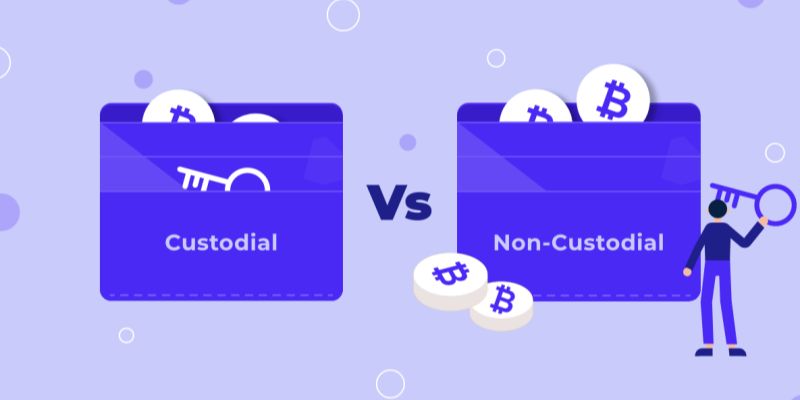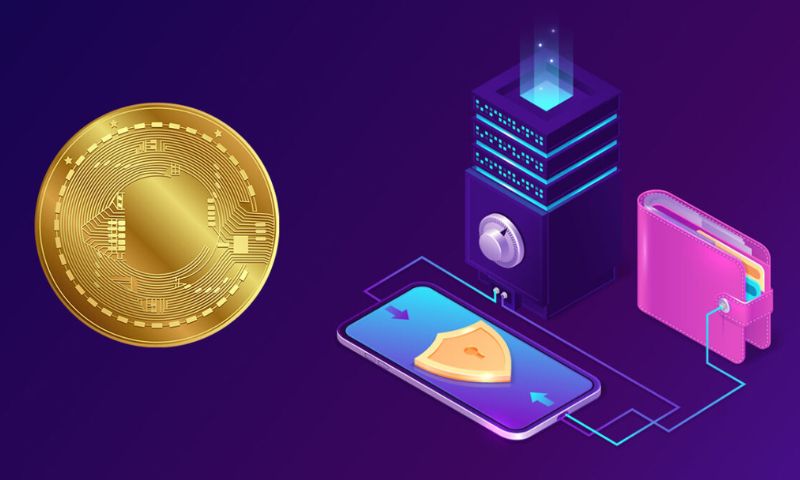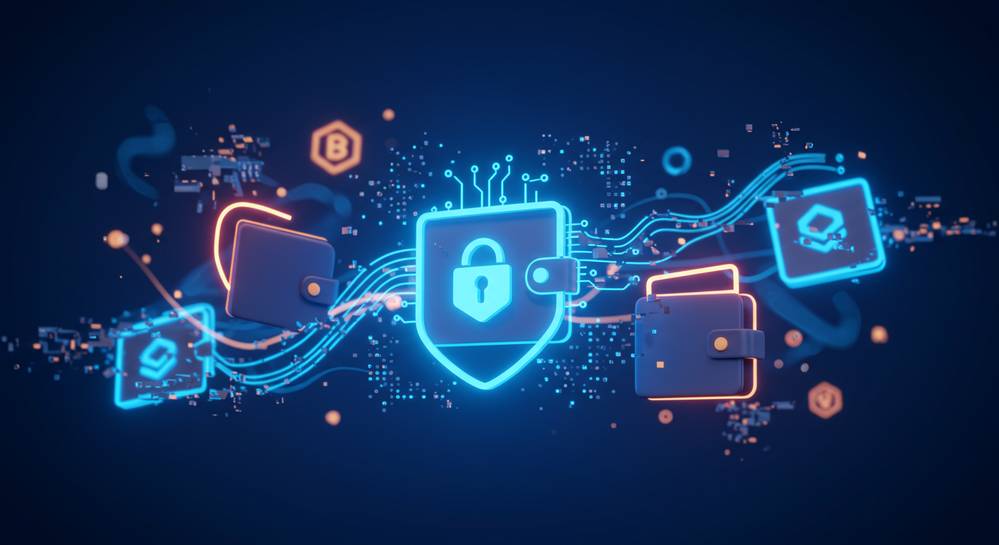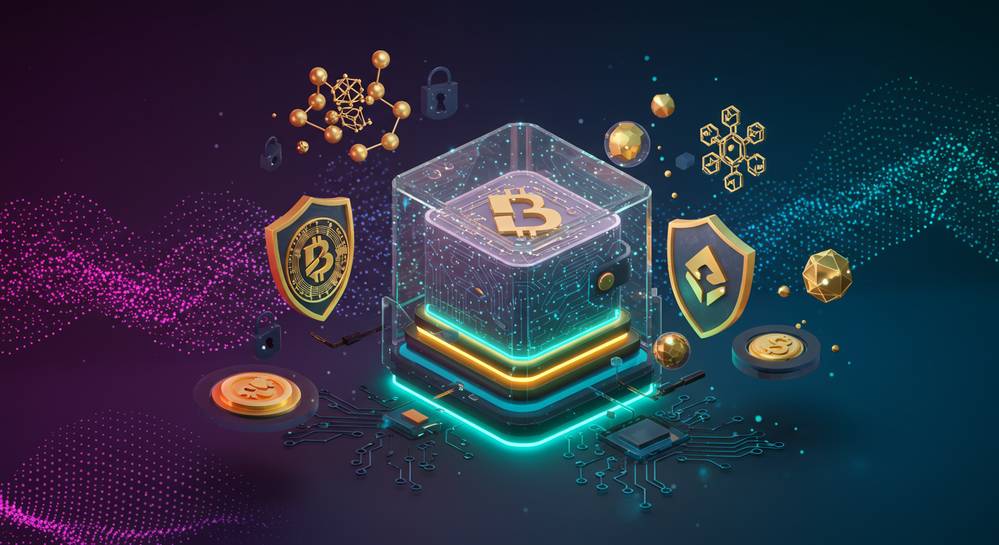When you dive into the world of cryptocurrency, one of the first decisions you’ll face is choosing between custodial vs non-custodial wallets. Do you want a wallet that a company manages for you, with easy access and support? Or do you crave the control and security that come with managing your own keys? Each choice has its perks and its risks. I’m here to guide you through these options, so you can pick the guardian for your crypto coins that best fits your needs. Let’s break down the walls of complex jargon and walk through the essentials of custodial and non-custodial wallets, unravel the features and risks, and empower you with the knowledge to make a wise decision.
Understanding Custodial Wallets: Convenience and Trust
Exploring Custodial Wallet Features
Custodial wallets make crypto easy for you. They store your digital assets so you don’t have to. These user-friendly crypto wallets offer a range of features. You can send, receive, and trade coins without hassle.
Think of a custodial wallet like a bank. They handle your money and you trust them to keep it safe. Just how custodial wallets work, they protect your digital cash. They use security measures to guard your coins. Plus, if you forget your password, they help you recover lost keys.
The Role of Centralized Crypto Storage and Third-Party Management
Centralized crypto storage means a company holds your coins for you. These third-party cryptocurrency managers are often part of an exchange. With a cryptocurrency exchange wallet, you can trade easily. They are very common and may be the first wallets new users try.
Why trust a third party? For starters, you don’t have to worry about losing access. You just ask for help and they fix it. If you’re new to crypto, this is a big benefit. You might not know how to handle private keys or backup phrases. The third party does this for you.
These wallets are like a cozy home for your crypto. They are simple, safe, and full of services. However, they are not without risks. You trust someone else with your digital cash. If they mess up, your coins might be gone. Yet for many, the ease is worth the chance.
Remember though, not all custodial wallets are the same. You should pick one that puts your security first. Look for those with strong security and a good record. This means they care about keeping your stuff safe.
Now, let’s be clear: this does not mean they are perfect. You give up some control. And when it comes to cyber attacks, risks can be higher. Yet, the perks keep people coming. From simple trading to helping with lost access, custodial wallets aim to serve.
In the end, choosing between a custodial and non-custodial wallet is about balance. Want more control and don’t mind a learning curve? Go non-custodial. Love ease and willing to trust? Custodial might just be for you. Always remember to weigh the benefits against the security risks custodial wallets may hold.
Stay informed and choose with care. This is your money, after all. Your choice in wallet decides how you connect with the vast world of crypto. Your guardian of choice should align with your needs for peace of mind and ease of access.

The Benefits and Risks of Custodial Wallets
Advantages of Using a Cryptocurrency Exchange Wallet
You might wonder, “What’s so great about custodial wallets?” These wallets make crypto easy to handle. Think of them as a bank for your digital coins. You sign up, and bam—you’re in the game. Centralized crypto storage has your back, keeping your digital cash safe.
Using a custodial wallet means someone else keeps tabs on your keys, the super-secret codes to your crypto. It’s like giving a trusted friend your rare baseball cards for safekeeping. With custodial digital asset storage, you don’t worry about losing keys—because you don’t hold them. If you forget your password, don’t sweat. You can get back in with help from the service.
Cryptocurrency exchange wallets shine here. They are user-friendly crypto wallets, perfect for anyone new or busy. They’re set up on exchanges where you buy or sell crypto. Imagine this: You trade some cash for a cool new coin. In seconds, it shows up in your wallet within the platform. Easy, right?
Now let’s dig into third-party cryptocurrency management. “Third-party” just means a company that isn’t you holds your keys. It’s like a safety deposit box. The company makes sure nobody gets in who shouldn’t. This means you trust the company—a lot.
Custodial features 3-5 perks to think about. Benefits of custodial wallets include hassle-free trades, easy recovery when you forget stuff, and someone else handling technical issues. In a nutshell, how custodial wallets work is simple: sign up, do your crypto thing, and let the pros worry about security.
Navigating the Security Risks of Custodial Wallets
But, here’s the catch. Security risks custodial wallets face are real. Just as with a real bank, there are risks. What if the company gets hacked? It’s rare, but it happens. And if the company goes under? Your crypto could go poof.
You’ve got to trust these folks with your precious digital cash. If you pick a shady company, you could be in for a world of heartache. Always check reviews and dig deep before trusting anyone.
Then there’s privacy. With a custodial wallet, the company knows what you have and what you’re doing with it. If you want to keep your crypto moves secret, this might not sit right with you.
And let’s chat about control. When you use one of these wallets, you’re handing over the keys to someone else. You trust them to take good care of your assets. So, choosing where to store your crypto is a big deal. Go for trusted, well-known places to lower your risk.
To sum it up, the benefits? Easy use, less stress, and quick help when you need it. The risks? The chance of hacks, less privacy, and you need to trust someone with your assets. Decide what matters most for you and pick your crypto guardian wisely.

Embracing Non-Custodial Wallets: Independence and Security
Non-Custodial Wallet Benefits and Private Key Ownership
Non-custodial wallets put you in charge. It means you own the private key and control your crypto. No middleman holds your funds. Your coins stay yours, no matter what. You avoid the risk of losing access if a third party goes under.
Non-custodial wallets work by letting you manage private keys. This gives you full power over your crypto. They are decentralized storage. Some find non-custodial options tough to grasp. But once you learn, it’s like riding a bike. They’re user-friendly after the first setup.
Private key ownership is huge. Imagine having a safe only you can open. That’s what owning your private keys is like. If you handle them right, your crypto is secure.
Benefits of non-custodial wallets? You get privacy and security. No one sees what’s in your wallet but you. You also skip out on waiting times or limits on your money.
Hardware Wallet Examples and Software Wallet Security
Let’s talk gear. Hardware wallets are like a vault for your crypto. Examples? Think Ledger or Trezor. They hold your keys offline. So, hackers can’t reach them. Cool, right? You connect to your computer only when you need to make a transaction. That’s cold storage for you.
Software wallets also keep keys. But they stay on your device. They can be apps on your phone or programs on your computer. They’re handy for quick access and trades. That’s hot storage.
But watch out! Online wallets face risks. Malware can invade, so your crypto needs defending. Software wallet security means keeping your software up-to-date. Always use strong passwords. Turn on two-factor authentication. And for extra safety, go for multi-signature wallets.
Software and hardware wallet security? Both need a tight ship. Backup seed phrases are your lifeline if something goes wrong. Lose your device? Your seed gets you back in control.
Choosing to be your own crypto guardian is wise. You want freedom? Check out non-custodial wallets. They’re a solid bet for keeping your digital cash secure.

Making an Informed Choice: Features and Security Strategies
Crypto Wallet Comparison: Custodial vs Non-Custodial
When you dive into the world of crypto, you’ll hear a lot about wallets. Here’s the deal: A wallet keeps your crypto safe and lets you do things with it, like buy stuff or trade.
Now, picture a custodial wallet as a safety deposit box in a bank. It’s kept secure by the bank, and they’ve got the main key. You trust them to take care of your stuff. Custodial wallets are like that. They’re often found on exchanges where you buy crypto. They make trading easy, but the exchange holds your keys, not you.
On the flip side, there’s non-custodial wallets. These are like having a safe at home. You hold the keys, and no one can open it but you. Self-managed and no middleman. Hardware wallets that look like USB drives, or apps on your phone can be non-custodial.
For everyday folks, custodial wallets are user-friendly. You forget your password, you can reset it. Simple. But one downside? If the third-party gets hacked or goes under, your crypto could be at risk.
With non-custodial wallets, if you know your stuff and like to call the shots, they’re great. You control your crypto 100%. But lose that key? There’s no “reset my password” button. It’s gone for good.
Key Recovery Solutions and the Importance of Backup Seed Phrases
Keys are what keep your crypto yours. Think of a key as a super special password. People with this password can control the crypto it unlocks. Every wallet has keys, and losing them is a big worry. So what’s a backup seed phrase? It’s a lifesaver.
When setting up most wallets, you get a list of random words – that’s your backup seed phrase. Write it down and keep it in a safe place. If you lose your wallet or forget a password, those words can get your crypto back. Simple and powerful.
But remember, anyone who gets their hands on your seed phrase can grab your crypto. So keep it secret, keep it safe. It’s one of the most crucial steps for protecting your digital coins.
Always keep two things in mind: how much you trust others with your crypto and how good you are at not losing keys. Like a lot in life, it’s all about finding the balance that works best for you. Whether you choose a custodial or non-custodial wallet, think about what features matter most and how you’ll keep everything safe. Your future self will thank you.
We’ve looked hard at custodial wallets, seen their ease of use, and the trust we place in others to hold our digital cash. We’ve weighed the good and bad, like the perks of exchange wallets and the threats we face when we’re not in control.
We also stepped into the world of non-custodial wallets, where freedom and safety rule. We’ve talked about owning keys and choosing hardware or software to guard our coins. When making your choice, consider what features you need and how you’ll keep your assets safe.
My final thought: learn, choose, and always have a backup plan. Your crypto journey hinges on the balance between control and security. Choose wisely.
Q&A :
What is the main difference between custodial and non-custodial wallets?
Custodial wallets are managed by a third party that keeps your private keys, granting them the ability to execute transactions on your behalf. This could be an exchange or a wallet service provider. Non-custodial wallets, on the other hand, give you full control over your private keys, which means you have exclusive access to your funds and are fully responsible for your wallet’s security.
How does the security of custodial and non-custodial wallets compare?
In terms of security, non-custodial wallets are generally considered more secure as they grant users sole access to their private keys, reducing the risk of hacking and unauthorized access associated with centralized systems. However, this means that if you lose your private key, you cannot recover your funds. Custodial wallets offer the convenience of recovery options but are more prone to hacking attempts since they store many users’ keys in one place.
Are there any accessibility differences between custodial and non-custodial wallets?
Accessibility can vary significantly between the two wallet types. Custodial wallets often provide a user-friendly interface and quick access to customer support, making them easier for beginners to navigate. They also allow users to recover their accounts if they forget their login credentials. Non-custodial wallets, while giving users more control, typically require a greater understanding of blockchain technology and do not offer the same level of customer support or account recovery options.
What should I consider when choosing between a custodial or non-custodial wallet?
When deciding between custodial and non-custodial wallets, consider your own experience and comfort with managing private keys, as well as your priorities in terms of security and convenience. If you prioritize ease of use and customer support, a custodial wallet may be more suitable. However, if maintaining complete control of your funds and heightened security is vital for you, then a non-custodial wallet could be the better choice.
Can I switch from a custodial to a non-custodial wallet or vice versa?
Yes, you can switch between the two types of wallets. To move from a custodial to a non-custodial wallet, you would typically withdraw your cryptocurrency from the custodial service to the address of your chosen non-custodial wallet. The process for moving from a non-custodial to a custodial wallet is similar; you would send your cryptocurrency from the non-custodial wallet to an address provided by the custodial wallet service. Always ensure the addresses are correct and the wallet types are compatible when conducting such transactions.



